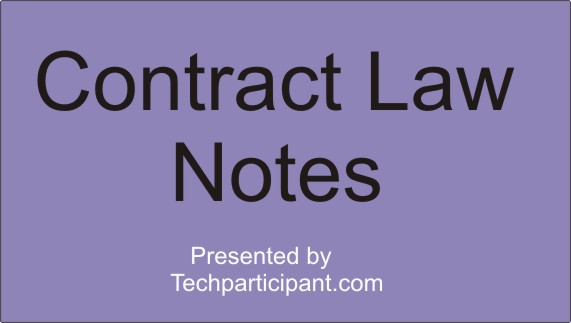Table of Contents
Contract Law Pdf:Principles on breaches of contract and Remedies
Ba llb notes on contract -I
You can follow us on instagram @freegooglenotes
Q. 4. State briefly the principles on which damages are
awarded on the breach of a contract.
Or
Examine critically the rule in Hadley v. Baxendale, and
indicate to what extent the said rule is applicable in India.
Or
“The damages which the other party ought to receive in
respect of breach of a contract should be such as may
fairly and reasonably be considered either arising naturally
from such breach of contract itself or such as may
reasonably be supposed to have been in the contemplation
of both the parties at the time they made the contract, as
the probable result of the breach of it.” Comment.
Ans. Contract law notes In order to establish a right to damages, the first thing the
plaintiff must show is that the loss which he has sustained was caused
by the breach. But assuming this can be proved, the law will nevertheless,
not compel the defendant to assume liability for all the loss which the
plaintiff may conceivably have suffered as a consequence of the breach.
Certain losses may be too ‘remote’, and for these the plaintiff is not
entitled to compensation,
Remoteness of Damages
In this connection, the general principle is that the law will not
compel the defendant to pay damages that are remote. The law on this
subject was founded by ALDERSON, B of the Court of Exchequer in
the famous case of Hadley v. Baxendale. The facts of the case are as
follows :
The plaintiff’s mill stopped due to the breakage of the
crankshaft, a vital part of the mill. The plaintiff, therefore,
wanted to send the shaft to a certain maker at Greenwich as
a pattern for a new one to be manufactured by them. The
plaintiff delivered the shaft to the defendant, a common carrier
for the purpose of being delivered to the makers at Greenwich.
The only circumstances communicated by the plaintiffs to the
defendant at the time of the contract were that the article to
be carried by them was the broken shaft of a mill and that the
plaintiffs were the millers of that mill. Delivery of the shaft to
the manufacturers at Greenwich was delayed due to some
negligence of the defendant. The plaintiff, therefore, could not
receive the shaft for several days and consequently the mill
could not start in time resulting in the loss of profits to the
plaintiffs which they would have earned, had the shaft been
received in time. The defendant resisted the claim of the
plaintiff on the ground that the damages were too remote. The
Court of the Exchequer ordered a new trial on the ground of
misdirection to the jury. Alderson, B while delivering the
decision propounded the oft-quoted rule in the following
words:
Contract law
“Where two parties have made a contract which one of them has
broken, the damages which the other party ought to receive in respect
of such breach of contract should be such as may fairly and reasonably
be considered either arising naturally, i.e., according to the usual course
of things, from such breach of contract itself, or such as may reasonable
be supposed to have been in the contemplation of both parties, at the time
they made the contract, as the probable result of the breach of it.”
The rule in Hadley v. Baxendale has the following two branches :
(a) The first branch deals with damages “as may fairly and
reasonably be considered either arising naturally i.e., according to the
usual course of things.” For the sake of brevity, we may refer to it as “General
damages,”
(b) the second branch deals with damage “as may reasonably be
supposed to have been in contemplation of both parties, at the time they
made the contract, as the probable result of the breach of it.” This may
be referred to as “Special damages.” (contract law)
General Damages
General damages depend “on the knowledge which the parties are
presumed to possess. For example in Hadley v. Baxendale, the only
circumstances communicated by the plaintiff defendants at the time of
the contract were that the article to be carried was the broken shaft of
a mill and that the plaintiffs were the millers of that mill. Since the
defendants had only this knowledge, plaintiff were entitled to recover
only the general damages from the breach of the contract.
Another leading case on the point is Horne v. Midland Railway
Company. In this case under a contract, the plaintiff had to deliver
military shoes in London by a particular date for the French army at very
high rates. The plaintiff delivered the shoes to the defendants to be
carried to London. They informed the defendants about the date of
delivery. The shoes having been delayed in a carriage, were rejected by
the intending purchasers. The plaintiff brought action to claim the
ordinary loss for the delay as well as the loss they suffered from the
rejection of the shoes by the intending purchasers. It was held that they
could not recover the loss suffered by them by the rejection of the shoes.
In order to recover such losses, they must prove that they had informed
the defendant of the special loss which they might suffer from the delay
in the delivery of the shoes.
Special Damages
Contract law pdf
Special damages may be successfully claimed only when they “may
reasonably be supposed to have been in the contemplation of both parties,
at the time they made the contract, as the probable result of the breach
of it.” For example, in Simpson v. London and North Railway Company:
The plaintiff used to send specimens of his goods for exhibition to
agricultural shows. After having exhibited them at Bedford he gave his
samples to an agent of the defendant company to be carried to a
show-ground at Newcastle. His consignment note contained the words :
“Must be at Newcastle Monday certain.”. Due to negligence of the
The company, the sample reached late and could not be exhibited at
Newcastle show. The plaintiff brought an action to recover damages for
his loss of profits at the Newcastle show. In this case, the Company was held
liable for its agent had the knowledge about the goods to be exhibited
at the Newcastle show and hence it was in the contemplation of the
A company that delays the delivery might lead to losses of such kind.
Law in India
In India, the relevant law is contained in Section 73 of the Contract
The act provides: “When a contract has been broken, the party who
suffers by such breach is entitled to receive, from the party who has
broken the contract, compensation for any loss or damage caused to
him thereby, which naturally arose in the usual course of things from
such breach, or which the parties knew, when they made the contract,
to be likely to result from the breach of it.”
It is clear from the above-noted provision that the framers of the
The act has incorporated the rule laid down in Hadley v. Baxendale, discussed
earlier, containing the two branches of the rule as pointed out earlier. The
merit of which Section 73, however, is in adding a number of illustrations
to make the rule clear and leave no scope for ambiguity. Section 73 also
includes within its ambit the quasi-contracts or certain relations
resembling those created by contract. It provides :
“When an obligation resembling those created by contract has
been incurred and has not been discharged, any person injured by the
failure to discharge it is entitled to receive the same compensation from
the party in default as if such a person had contracted to discharge it
and had broken his contract.”
Thus for the purpose of providing remedies, no distinction has been
made between the contracts and quasi-contracts.
Illustrations to Sec. 73
(a) A contracts to sell and deliver 50 maụnds of saltpetre to B,
at a certain price to be paid on delivery. A, breaks his promise. B is
entitled to receive from A by way of compensation, the sum, if any, by
which the contract price falls short of the price for which B might have
obtained 50 maunds of saltpetre of like quality at the time when the
saltpetre ought to have been delivered.
(b) A hires B’s ship to Bombay, and there take on board, on the
first January a cargo which A is to provide and to bring it to Calcutta,
the freight to be paid when earned. B’s ship does not go to Bombay, but
B has opportunities of procuring suitable conveyance for the cargo upon
terms as advantageous as those on which he had chartered the ship. A
avails himself of those opportunities, but is put to trouble and expense
in doing so. A is entitled to receive compensation from B in respect of
such trouble and expense.
(c) A contract to buy of 3, at the stated price, 50 maunds of rice, no
time being fixed for delivery. A afterwards informs B that he will not
accept the rice if tendered to him, B is entitled to receive from A by
way of compensation the amount, if any, by which the contract price
exceeds that which B can obtain for the rice at the time when A informs
B that he will not accept it.
(d) A contracts to buy B’s ship for 60,000 rupees, but breaks his
promise. A must pay to B, by way of compensation, the excess, if any of
the contract price which B can obtain for the ship at the time of the
breach of promise.
(e) A, the owner of a boat, contracts with B to take a cargo of jute
to Mirzapur, for sale at that place, starting on specified day. The boat,
owing to some avoidable cause does not start at the time appointed,
whereby the arrival of the cargo at Mirzapur was delayed beyond the
the time when it would have arrived if forwarded in de course, and it is market
price at the time and before the arrival of the cargo, the price of jute
falls. The measure of the compensation payable to B by A is the difference
between the price which B could have obtained for the cargo at Mirzapur
at the time when it would have arrived if the boat had sailed according
to the contract and the price after that date, when it actually arrived.
(f) A contracts to repair B’s house in a certain manner and receives
payment in advance. A Repairs the house, but not according to contract.
Bis entitled to recover from A the cost of making the repairs that conform
to the contract.
(g) A contracts to let his ship to B for a year, from the first of
January, for a certain price. Freights rise, and on the first of January,
the hire obtainable for the ship is higher than the contract price. A breaks
his promise. He must pay to B, by way of compensation, a sum equal to
the difference between the contract price and the price for which B
could hire a similar ship for a year on and from the first of January.
(h) A contracts to supply B with a certain quantity of iron at a
fixed price, being a higher price than that for which A could procure
and deliver the iron. B wrongfully refuses to receive the iron. B must
pay to A, by way of compensation, the difference between the contract
price of the iron and the sum for which A could have obtained and
delivered it.
(i) A delivers to B a common carrier, a machine, to be conveyed
without delay, to A’s mill informing B that his mill is stopped for want
of the machine. B unreasonably delays the delivery of the machine, and
A in consequence, loses a profitable contract with the Government, A
is entitled to receive from B, by way of compensation, the average amount
of profit which would have been made, by the working of the mill during
the time that delivery of it was delayed but not the loss sustained through
the loss of the Government contract.
(1) A, having contracted with B to supply B with 1,000 tons of iron
at 100 rupees a ton, to be delivered at a stated time, contracts with C
for the purchase of 1,000 tons of iron at 80 rupees a ton telling C that
he does so for the purpose of performing his contract with B. C fails to
in
perform his contract with A, who cannot procure other iron and B,
consequences rescind the contract. C must pay to A 20,000 rupees being
the profits which A would have made by the performance of his contract
with B.
(k) A contracts with B to make and deliver to B by a fixed day,
for a specified price, a certain piece of machinery. B does not delivery
the pieces of machinery at the time specified, and in consequences of
this B is obliged to procure another at a higher price than that which
he was to have paid to A, and is prevented from performing a contract
which B ‘had made with a third person at the time of his contract with
A (but which had not been then communicated to A) and is compelled
to make compensation for breach of the contract. A must pay to B by
way of compensation, the difference between the contract price of the
pieces of machinery and the sum paid by B for another but not the sum
paid by B to the third person by way of compensation.
(1) A, a builder, contracts to erect and finish a house by the first
of January, in order that B may give possession of it at that time to C,
to whom B has contracted to let it. A is informed of the contract between
B and C, A builds the house so badly that, before the first January, it
falls down and has to be re-built by B, who in consequence loses the
the rent which he was to have received from C, and is obliged to make
compensation to C for the breach of his contract. A must make
compensation to B for the cost of re-building the house for the rent lost,
and for compensation made to C.
(m) A sells certain merchandise to B, warranting it to be of a
particular quality, and B, in reliance upon this warranty, sells it to C with
a similar warranty: The goods proved to be not according to the warranty,
and B becomes liable to pay C a sum of money by way of compensation.
B is entitled to be reimbursed this sum by A.
(n) A contracts to pay a sum of money to B on a day specified.
A does not pay the money on that day. B, in consequence of not receiving
the money on that day, is unable to pay his debt and is totally ruined.
A is not liable to make good to B anything except the principal sum he
contracted to pay, together with interest up to the day of payments.
(o) A contracts to deliver 50 maunds of saltpetre to B on the first
of January, at a certain price. B afterwards, before the first of January,
contracts to sell the saltpetre to C at price higher than the market price
of the first January. A breaks his promise. In estimating the compensation
payable by A to B, the market price of the first of January, and the
profits which would have arisen to B from the sale to C, is to be taken
into account.
(p) A contracts to sell and deliver 500 bales of cotton to B on a
fixed day. A knows nothing of B’s mode of conducting his business. A
breaks his promise, and B, having no cotton, is obliged to close his mill.
A is not responsible to B for the loss caused to B by the closing of the
mill.
(q) A contracts to sell and deliver to B on the first of January,
the certain cloth which B intends to manufacture into caps of a particular
kind, for which there is no demand, except at that season. The cloth is
not delivered till after the appointed time, and too late to be used that
year in its making caps. B is entitled to receive from A, by way of
compensation, the difference between the contract price of the cloth and its
the market price at the time of delivery, but not the profits which he expected
to obtain by making caps nor the expenses which he has been put to in
making preparation for the manufacture.
(1) A, a ship-owner contracts with B to convey him from Calcutta
to Sydney in A’s ship, sailing on the first of January, and B pays to A,
by way of deposit, one-half of his passage-money. The ship does not sail
on the first January and B after being, in consequence, detained in
Calcutta for some time, and thereby put to some expense, proceeds to
Sydney in another vessel, and, in consequence, arriving too late in Sydney,
loses a sum of money. A is liable to repay to B his deposit, with interest
and the expense to which he is put by his detention in Calcutta, and the
excess, if any, of the passage-money paid for the second ship over that
agreed upon the first, but not the sum of money which B lost by arriving
Sydney too late.
Reference may also be made to a Supreme Court case, namely
Karsandas H. Thacker v. M/s. The Saran Engineering Co. Ltd., the facts
of which are as follows:
The appellant sued the respondent for the recovery of Rs. 20,700
for damages for the breach of contract which he entered into with the
respondent for the supply of 200 tons of scrap iron in July 1952 through
correspondence. In the meantime the appellant entered into a contract
with one M/s Export Corporation, Calcutta for supply of 200 tons of
scrap iron to them. The respondent failed to supply the scrap iron.
Consequently, the appellants claimed the difference in price which they
had to pay to Ms. Export Corporation who purchased the necessary
scrap iron from the open market because the appellants failed to supply
them. A significant thing to be noted in connection with this case is that
at the relevant time when the contract was entered into as also when the
breach of it took place, scrap iron was a controlled commodity. It was,
however, urged on behalf of the appellants that when prices were
controlled, the suggestion to purchase at a very fancy price was a clear
indication of the appellant’s purchasing it for export. The Court had, therefore, to decide whether the respondents knew that the appellants
purchasing it for export or that they had entered into, on the basis
of their contract with the respondents, a contract with one Export
A corporation who wanted it for export. The trial court decided in favour
of the appellant but in appeal, the High Court reversed the decree of
the lower court on two grounds namely, (i) respondent could not perform
their contract on account of laches (delays) on the part of the appellant
were
and (ii) no damage resulted as the controlled price for scrap iron remained
the same in January 1953 as it was in July 1952. The Supreme Court upheld
the decision of the High Court that the respondent did not know that
appellant was purchasing scrap iron for export. The Supreme Court
observed,” The offer to purchase at a very fancy price appears to be
very remote and slender basis for coming to the conclusion that the
respondent Company must have known that the appellant wanted to
purchase the items for export.” The highest Tribunal further observed :
“As the parties did not know and could not have known when the
a contract was made in July 1952 that the scrap iron would be ultimately
sold by the appellant to the Export Corporation, the parties could not
have known of the likelihood of loss actually suffered by the appellant,
according to him, on account of the failure of the respondent to fulfil
the contract.” The Court further added,” Illustration (k) to Section 73
of the Contract Act is apt for the purpose of the case. According to that
illustration, the person committing a breach of contract has to pay to the
other parties the difference between the contract price of the articles
agreed to be sold and the sum paid by the other party for purchasing
another article on account of the default of the first party, but the first
the party has not to pay the compensation which the second party had to
pay to third parties as he had not been told at the time of the contract
that the second party was making the article or delivery to such third
parties.” Thus upholding the decision of the High Court, the Supreme
The court dismissed the appeal.”
It is well-settled law that when damages arise, the court is not
assessing the pecuniary liability which already exists. The Court for the
first instance must decide that the defendant is liable and then it is to
proceed to assess that liability is. But till the determination, there is no
liability settled upon the defendant. A claim for damages for a breach
of a contract is, therefore, not a claim for a sum presently due.
Where in a breach of contract there are overlapping claims for
successive breaches against two defendants and the plaintiff enter into
a settlement agreement with one defendant in “full and final satisfaction
of claim, the claim against the other defendant is not extinguished. This
was held by the Court of Appeal in Heaton v. Axa Equity & Law Life
Assurance Society PLC. Explaining the reason for the decision, the Court
of Appeal observed that in this case the contractual claims against the
defendants were claims with regard to consecutive breaches of separate
contract and constituted an independent cause of action. Moreover the
breaches had given rise to a real and substantial loss to their reputation
and standing in the financial services industry. Since the claims of financial
misconduct by the plaintiffs constituted serious allegations which the
defendants were still persisting in making allegations against them, the
continuation of the proceeding by the plaintiffs against the other
defendant for the purpose of refuting them could not be regarded as an
abuse or misuse of the process.
Where the plaintiff interested in purchasing house property and
shifting therein, instructed a surveyor to report whether the property was
affected by aircraft noise and the surveyor negligently reported that the
the property was unlikely to be affected by aircraft poise, the plaintiff
purchased the property and found that it was substantially affected by
aircraft noise and decided not to move or shift. It was held that the
The plaintiff was entitled to damages against the surveyor for loss of amenity.
Conclusion:-
Contract Law Pdf: Principles on breaches of contract and Remedies
hope it may be helpful for you. you may also like









